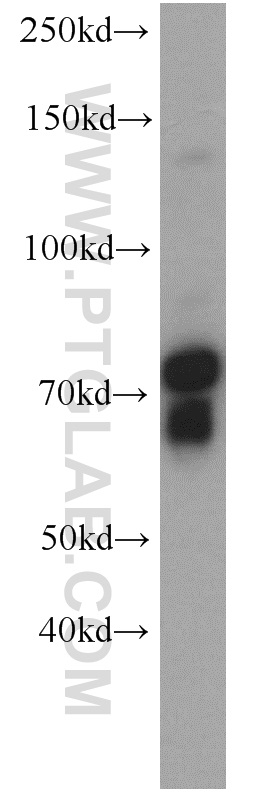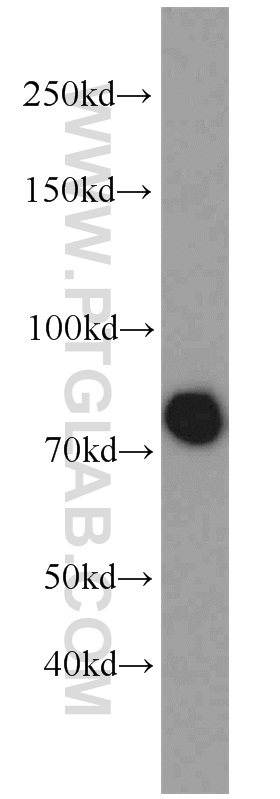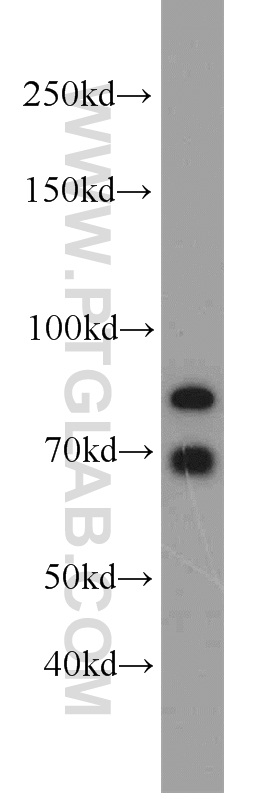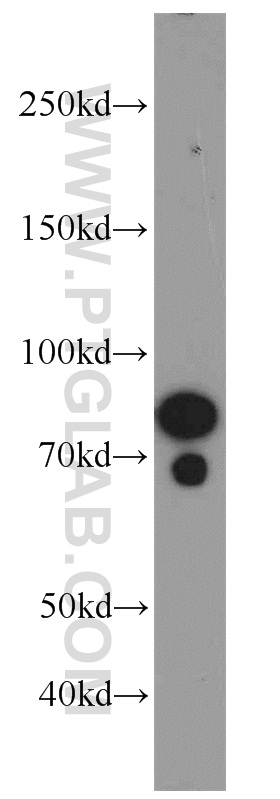验证数据展示
经过测试的应用
| Positive WB detected in | Y79 cells, HEK-293 cells, mouse brain tissue |
推荐稀释比
| 应用 | 推荐稀释比 |
|---|---|
| Western Blot (WB) | WB : 1:500-1:1000 |
| It is recommended that this reagent should be titrated in each testing system to obtain optimal results. | |
| Sample-dependent, Check data in validation data gallery. | |
产品信息
18839-1-AP targets SORCS1 in WB, ELISA applications and shows reactivity with human, mouse samples.
| 经测试应用 | WB, ELISA Application Description |
| 经测试反应性 | human, mouse |
| 免疫原 | Peptide 种属同源性预测 |
| 宿主/亚型 | Rabbit / IgG |
| 抗体类别 | Polyclonal |
| 产品类型 | Antibody |
| 全称 | sortilin-related VPS10 domain containing receptor 1 |
| 别名 | hSorCS, SORCS1 |
| 计算分子量 | 1168 aa, 130 kDa |
| 观测分子量 | 130 kDa, 60-80 kDa |
| GenBank蛋白编号 | BC131597 |
| 基因名称 | SORCS1 |
| Gene ID (NCBI) | 114815 |
| RRID | AB_2878564 |
| 偶联类型 | Unconjugated |
| 形式 | Liquid |
| 纯化方式 | Antigen affinity purification |
| UNIPROT ID | Q8WY21 |
| 储存缓冲液 | PBS with 0.02% sodium azide and 50% glycerol , pH 7.3 |
| 储存条件 | Store at -20°C. Stable for one year after shipment. Aliquoting is unnecessary for -20oC storage. |
背景介绍
SorCS1 is a 130 kDa type I transmembrane protein, belonging to Vps10p-domain (Vps10p-D) receptor family that comprises an N-terminal Vps10p-D, a leucine-rich domain, a single transmembrane domain, and a short cytoplasmic domain. SorCS1 is synthesized as a proprotein, which is converted to the mature receptor in late Golgi compartments by cleavage of the N-terminal propeptide. Alternative splicing of human SorCS1 results in four isoforms with different cytoplasmic domains and differential expression in tissues. This antibody was generated against the C-terminal region of human SorCS1 and recognizes various forms of SorCS1. Multiple bands around 100-130 kDa as well as 60-80 kDa have been detected in Y79 cells by western blot assay.
实验方案
| Product Specific Protocols | |
|---|---|
| WB protocol for SORCS1 antibody 18839-1-AP | Download protocol |
| FC protocol for SORCS1 antibody 18839-1-AP | Download protocol |
| Standard Protocols | |
|---|---|
| Click here to view our Standard Protocols |



